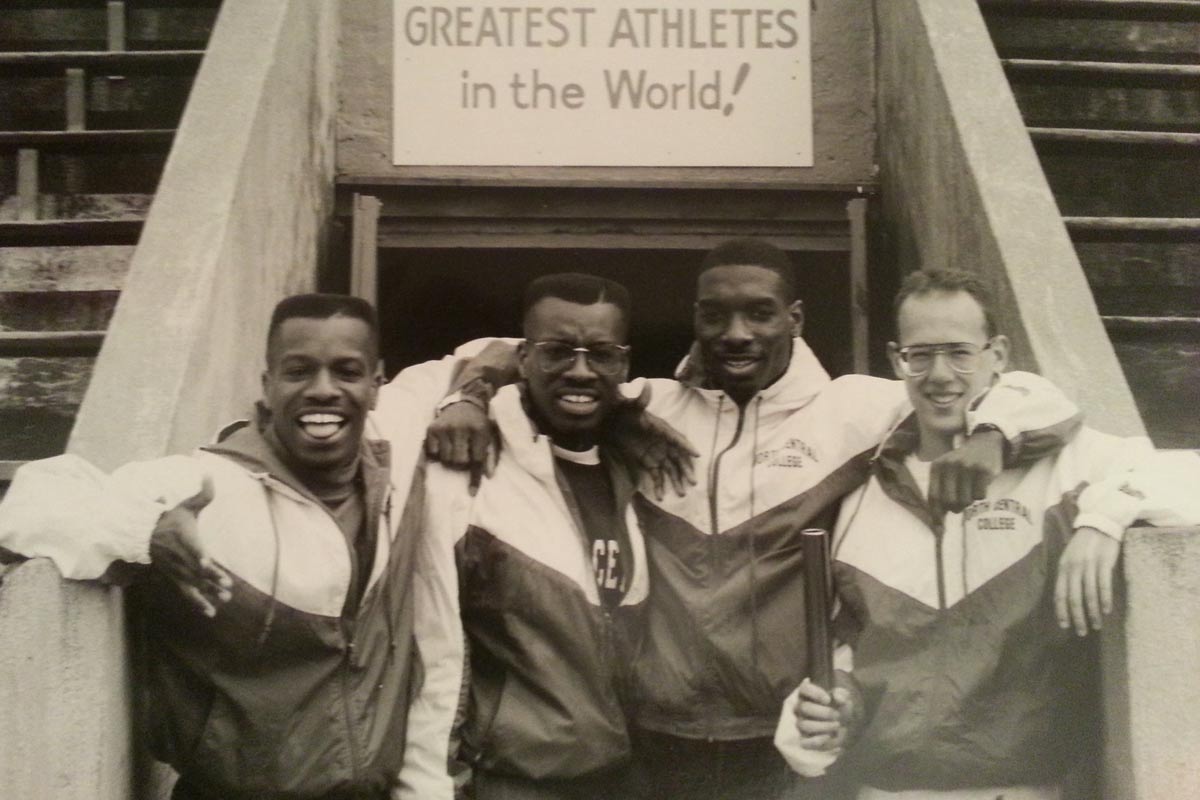Stereotype Threat: It exists and you need to know how to deal with it

1992 Drake Relays 4x400m Relay Champions North Central College -- Gerald McCadd, Harold McCadd, Andre Coleman, Gale Van Rossem
Stereotype threat exists, but techniques to deal with it can be learned
Stereotype threat exists and I have experienced it before. In my opinion, the key to dealing with it can be found in sports psychology.
Throughout my life, I have been an athlete. I played many sports growing up and I was always the fastest kid my age in my entire town. I continued to play football and basketball in high school, but my main sport was always track and field. I came very close to making it to the Illinois State championships in the 400m as a Sophomore in high school, and I went to state my Junior and Senior years in the 400m as well as the High Jump as a Senior.
I was always very aware of the negative stereotype of white athletes in track and field. However, I know that it never affected me in any way. I can only attribute this to my parents teaching me that the stereotype was just a stereotype and didn't necessarily hold truth.
I went on to run track at North Central College in Naperville, Il. NCC is an NCAA Division III school that was and is a perrenial powerhouse at the National Championships. My Freshman year, I fought tooth and nail to barely make the 4x400m relay team that ended up becoming, arguably the greatest realy team in the history of the school.
The story of how I made the team is an incredible one in itself, but I don't have the space to write about it in this post. Basically, I moved up about 6 spots on our depth chart throughout the season just to become the alternate on the team that was headed to Nationals. I was the only white guy on the team. I didn't really care and I don't think anyone else did either.
I actually had to have a heart to heart talk with the coach to even get him to take me as the alternate on the team. Usually, alternates at this level would be the equivalent of Peyton Manning's backup QB. You're more like a waterboy, and you aren't going to actually run.
In my case, the unthinkable happened, and I had an incredible opportunity that came with a great deal of pressure when the 4th runner on the team became sick the night before the national championships.
I handled the pressure like a seasoned pro, and cemented my spot on a relay team that would become legendary at NCC. The main reason we were so great was the fact that we genuinely cared about each other. There wasn't any reason that stereotype threat would ever affect my performance or that of any of my teammates.
Having said all that, I have experienced stereotype threat in what may seem like a very unlikely place. I took up the sport of tennis relatively late in life. I had a great deal of natural athletic talent, and I had an understanding of sports psychology that allowed me to be competitive at a relatively high level very quickly.
As a track and field athlete at NCC, I had been a student of sports psychology. My intent was to suck every last drop out of my potential. Shouldn't that be our goal at everything we do?
Throughout my time at NCC and in the many years since, I have always paid very close attention to how other athletes and individuals manipulate their own frame of mind to get the most out of their potential. I have honed my techniques in every conceivable way and found how to maximize my performance in any sport or situation.
I have come to realize that the most important mind set in sports, and I believe in life, is to have a "Play to Win" philosophy, rather than a "Play not to lose" mentality.
I have seen this over and over again in almost every sport. PNL (Play Not to Lose) coaches, teams and individuals tend to have an advantage in the short term (early days of a sport, or early years of rule changes), but those who are able to allow themselves to fail in the short term have the ability to learn more and become better over the long term. These entities (coaches, teams, players) are able to embrace a PTW (Play To Win) approach and tend to slaughter their more conservative opponents on a regular basis.
I approached tennis with a PTW philosophy and I noticed that the great players of the day have embraced the same mindset. They play seemingly high risk tennis and they do not cower under pressure the way tennis players of 20 years ago did.
Unfortunately for me, I joined a team of individuals who learned to play tennis 20 years ago. In fact, local tennis pros of today still approach the game with a ludicrous and almost laughable PNL philosophy. The elite coaches have a very comprehensive understanding of sports psychology and teach their students a style that is literally 180 degrees from the local pros.
I've tried to explain all of this to a guy who has played tennis for 20 years and has figured out a way to win with PNL approach. He isn't going to buy it. He is, in effect, completely ignorant about the game of tennis and sports psychology. But he has hit 10 million tennis balls in his lifetime and I have only hit 10 thousand. He beats me on the court, barely, despite the fact that he has 18 years of experience on me. In his mind, he is my master at the sport of tennis and he will be until I actually beat him.
The real problem here is that it's not just him. It's everyone on my team and the unsolicited advice that I get everytime I lose a match. Everyone knows exactly why I'm not winning, and it's always because I'm playing too risky of a style. Now everytime I step on the court I am more concious of making a mistake, because if I lose the match, I know that someone is going to say that I shouldn't have taken so many risks, blah, blah, blah...
I know how the game is supposed to be played, and I understand it on a level that these guys cannot comprehend. This isn't my ego speaking, I know this for a fact. I have challenged my belief thousands of times in my head and I have sought out the advice of actual elite coaches who have confirmed that my approach is identical to their own.
When I step on my local tennis court, none of this matters, except that I have an absolutely burning desire to prove that my approach is correct. It shouldn't take wins to prove it, but that is the only thing these guys will take.
I absolutely fell in love with the sport of tennis in the first few years that I played. That is, until I joined this team. I began to hate the sport. Everytime I stepped on the court it was me against the world. I was missing shots that I wouldn't miss in a million years only because every miss was magnified. Every shot became a struggle.
So, I was experiencing stereotype threat as a "risk taker." I never knew there was such a thing, but if you get labled as such in league tennis it can become a virtual tennis death sentence. No one wants you on their team because they percieve that you don't understand the game. It's like you live in a bizzaro world. You know that the sky is up, but everyone else thinks it is down.
For three years, I beat my head against the wall, but I never gave up on my philosophy. It took a serious toll on me though. My wife couldn't understand why I was so upset all the time. It was seriously ruining my life. I could have quit, or I could have just caved and started playing the way they wanted. I probably would have started winning. I never would have come close to my potential though.
I cannot imagine what it would be like to have to deal with this kind of stereotype threat in a more important setting such as school or work. I can excuse the league players for their ignorance, because, it was just tennis after all. However, it had a profoundly negative effect on my life for about 3 years.
Ultimately, I was able to progress and prove that my approach worked when I finally broke through and not only won matches but got bumped up to the 4.5 level in league tennis. I still ran into many players who disagreed with my approach, but I gained enough respect that it didn't have such a powerful effect on me anymore.
I watched as other players, who were also very athletic, would come in one by one and get mowed down by this system. Ultimately comprimising their own beliefs of how the game should be played and, ultimately slowing their progress even more.
I think Tiger Woods is one of the greatest examples of how sports psychology can help a person break through against incredible odds. I cannot think of an athlete that had to deal more with stereoptype threat than Tiger in the past 30 years. He was taught sports psychology by his father Earl Woods. Whether or not you are a fan of Tiger, and his fathers training methods, it is obvious that they understood how to put Tiger into the perfect state of mind to believe that he could win no matter what the odds were.
As an athlete in college, I learned from some of the best coaches in the world that I needed to approach every competition in the exact same way. Each competition was, in effect, a dress rehearsal for the next competition. Our goal was to find a routine that worked for us and then use the same routine to prepare for every competition. One of the biggest keys to our success was to approach the national championships the exact same way that we approached every competition throughout the season.
The coaches always reminded us that most athletes fell into the trap of thinking that they needed to do something even better when they got to nationals. They stressed that we should just plan to do exactly what we had done to get there and let the rest take care of itself. The results speak for themselves year after year. It's been going on for 40 years now. Athletes treat the national championship the same way they approach a local dual meet and they proceed to break personal records and win championships without putting extra pressure on themselves to do so.
What sports psychology is all about is reducing the effects of pressure on the athlete in the moment of competition. Coaches and athletes use every technique they can think of to combat pressure. These techniques do not neccessarily come easily to an athlete, and I believe that some athletes suffer more than others simply because of one loss that happens early in their career.
There are two incredible examples of athletes who had to overcome incredible stereotype threat pressure to get their first major wins. Phil Mickelson in golf and Andy Murray in tennis. As someone who has studied sports psychology, it was obvious that the only thing that had changed in either players game that allowed them to break through was their frame of mind and how they handled the pressure of the moment and how they reacted when they made mistakes. Each player had to realize that mistakes were part of the game and did not mean that they were headcases. They had to embrace failure before they could ultimately win.
When a professional athlete is labeled a head case by the public, this is perhaps one of the most difficult cases of stereotype threat to break. Granted, it's still just a sport and not as important as cases involving race or gender. Still, can you imagine trying to break a negative stereotype that the whole world has of you? If these guys can break through, and they did, there is hope for all of us.
I am absolutely certain that anyone can learn these techniques, but there are very few people in the world who understand them, and even fewer who have mastered them and put them to use in a stressful situation.
My advice to anyone facing stereotype threat would be to seek out and talk to anyone who you can find who understands what you are going through. To deal with the stress, focus only on the factors you can control, and try to embrace the possibility of failure. Allow yourself to be less than perfect. Focus on doing the best you can and realize that is all that anyone could expect from you.
If it's a situation like my tennis example, stick to your guns and persevere. Take a long term approach and learn from every opportunity you have. Every competition or test is a chance to improve. Remember that where you are today does not dictate where you will end up next week or next month or next year.
If you are experiencing stereotype threat at school or work, do everything you can do to reduce the amount of pressure you are putting on yourself. Also, rememeber that stereotypes are just that. They don't have power over you unless you let them have power over you. Stereoptypes will never go away completely, so the best thing we can do as a society is learn how to deal with them effectively.
As a society, I don't think there is any way that we can mandate stereotypes out of existence without completely destroying all freedom in our society. We should focus on teaching everyone the same techniques that athletes are using to deal with pressure. At the same time, continuing to educate the public about the destructiveness of stereotyping and stereotype threat.
Let's do something EPIC!





